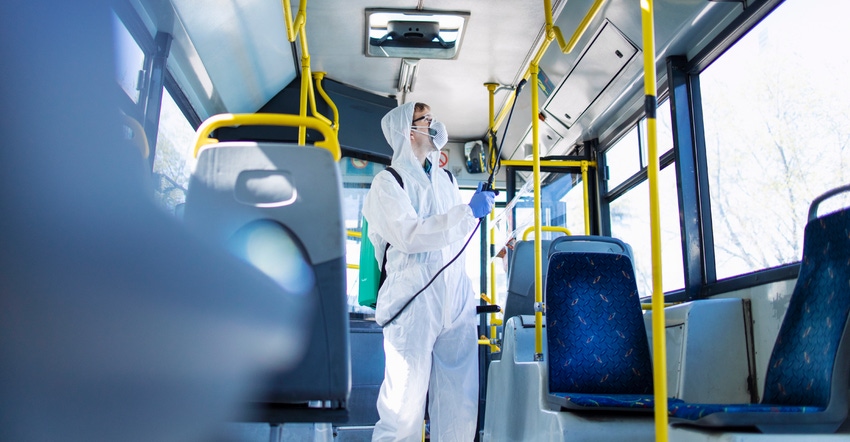
Utilizing an electronic logging device (ELD) compliance solution in its 4,700 vehicles, Clean Harbors is on the frontlines of the fight against Covid-19.
The company, which provides disinfection and decontamination services and hazardous and infectious waste disposal, has four decades of experience dealing with large-scale decontamination work. Clean Harbors helped during outbreaks of avian flu, swine flu, and H1N1; provided decontamination stations at Ground Zero in New York following the 2001 terrorist attack; aided cleanup efforts in the Gulf of Mexico after the Deepwater Horizon oil spill; and responded to anthrax terrorist attacks in New York and New Jersey.
Now the Norwell, Mass.-based company is dispatching thousands of trained experts to help more than 1,300 businesses decontaminate and remove hazardous waste through a program it has dubbed “D3 Clean: Disinfection. Decontamination. Disposal.”
Chuck Geer, senior vice president of field services and head of Clean Harbors’ decontamination efforts, says the program is a one-stop shop for businesses that employs experts to perform its three main elements: deep cleanings to prevent the virus; decontamination if there is an infected person at the site; and disposal of all potentially infected waste.

Chuck Geer, senior vice president of field services and head of Clean Harbors
“In a world in which disposable rubber gloves and paper masks are suddenly making parking lots dangerous due to infectious waste, many businesses are understandably underprepared,” Geer says. “But with crews across the United States and Canada, we’re here to help.”
The services Clean Harbors is offering customers in response to the pandemic range from onsite disinfection to decontamination of customer sites.
Clean Harbors has completed more than 2,800 decontamination jobs across the U.S. and Canada for an array of business such as airports and airlines, railroads and rail lines, rental car companies, sports arenas, schools, universities, hotels, government buildings, manufacturers, grocery stores, and food and beverage wholesalers.
“We’re also working with health care providers and hospitals to handle, transport, and dispose of infectious waste ranging from single drums at Covid-19 testing sites to trailers full of waste from temporary hospital sites,” Geer says. “Our ongoing disinfection work helps prevent coronavirus, while full decontamination work is where crews wearing Level C hazmat suits use EPA approved SARS-COV-2 chemicals to render a facility safe again following the presence of coronavirus at the location.”
To help track hours of service (HOS) to ensure compliance with regulations for its drivers and real-time GPS within its fleet, Clean Harbors is rolling out an ELD compliance solution from San Francisco-based Samsara, a fleet technology provider that serves customers responsible for critical infrastructure.
“They needed a reliable ELD solution, one they could depend on to provide complete HOS visibility and real-time GPS, even in remote areas,” says Rushil Goel, vice president of GM fleet management at Samsara. “Access to this kind of actionable data is vital in any decontamination service, but especially now on emergency response jobs when every second counts.”

Rushil Goel, vice president of GM fleet management at Samsara
Clean Harbors, which had been tracking its fleet with another telematics provider, faced connectivity issues like not being able to get a GPS ping due to vehicles operating in remote areas.
“After an introductory demo with Samsara, our teams partnered for six months to identify their unique business needs, trial our real-time tracking capabilities, and begin the initial rollout of Samsara’s platform,” Goel says.
Clean Harbors uses Samsara to make sure drivers have accurate HOS, that they are dispatching safe, legal trucks, and that the logs do not have any needed corrections or unassigned miles.
“Clean Harbors is also using Samsara for real-time GPS tracking during this crisis response,” Goel says. “It’s extremely important for their team to keep track of where drivers are and ensure that they’re safe.”
Just as critical for drivers, especially for the waste and recycling industry, Clean Harbors is offering best-practice solutions for vehicle sanitization so drivers can remain safe while providing essential services.
“The hard part is keeping your cab disinfected,” Geer says. “Any time you leave, you risk contamination once you step back in. When outside, follow distancing measures. Wash your hands or sanitize after touching anything. Make sure your hands are thoroughly washed when reentering your truck. If you’re wearing gloves, dispose of them before getting back into your cab. Same goes for a disposable mask.”
Clean Harbors recommends that drivers disinfect their cabs and keep them uninfected.
“At the start of your day, spray or wipe down your cab with chemical that’s at least 70% alcohol,” Geer says. “When at the store, Clorox Commercial Solutions disinfecting wipes are easy to come by, but any store brand will do, as long as it has the 70% ratio. Hit all the high-touch areas: wheel, shifter, seatbelt, radio. Anything you touch needs to be wiped down. Then let the chemical do its work. The number one mistake people make is wiping off the chemical before it’s dried. Let it stand for about 10 minutes and dry on its own.”
To protect the safety and health of drivers, Goel says dashcams are an effective technology for improving fleet safety. Dashcams allow fleet managers to identify driving behavior so they can pinpoint and respond to high-risk drivers with appropriate coaching.
“Samsara’s AI dashcams analyze the road and driver behavior in real time,” Geer says. “By sending alerts to drivers and actionable insights to managers, these intelligent cameras are proven to improve driver safety and lower fleet costs.”
Decontamination is one of Clean Harbors’ more than 50 lines of business, but during these unprecedented times, it has proven to be an essential service.
“Decontamination work is what we do, and we’re incredibly proud, now more than ever, to do it,” Geer says. “We’re going to continue to work as hard as we can to stem this terrible virus and help bring the world back to normal.”
About the Author(s)
You May Also Like


